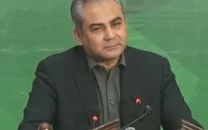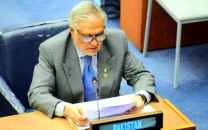LHC dismisses plea against caretaker setup
Justice Hassan expresses reservations about entertaining such applications

The Lahore High Court on Monday dismissed a plea seeking to declare the "extended stay" of caretaker Prime Minister Anwarul Haq Kakar beyond the prescribed timeframe as “unconstitutional”, deeming it non-maintainable.
Justice Shahid Bilal Hassan heard the plea.
During the proceedings, Justice Hassan expressed reservations about entertaining such applications and questioned whether the court could issue an order for the caretaker PM.
The law officer apprised the court that Justice Raza Qureshi had previously dismissed a petition of similar nature.
Justice Hassan noted that in compliance with the Supreme Court's order, the Election Commission of Pakistan had set the election date, and the caretaker PM had ensured the conduct of elections.
Strongly opposing the plea, the law officers argued against declaring the extended stay of the interim PM as illegal and unconstitutional.
The petitioner, Muhammad Muqsit Saleem, filed the plea naming the caretaker PM, the Cabinet Division through its secretary, and the ECP through the chief election commissioner as respondents.
Saleem argued that the caretaker government, which took office on Aug 14, 2023, ceased to exist on Nov 15, 2023. He contended that any decisions made by the caretaker government after this date would be illegal and invalid.
The petitioner emphasised that an extension in the election date should not automatically extend the caretaker government's mandate.
He urged the court to consider the serious implications of the matter, especially in the current political climate where legal and constitutional issues were often dismissed without close scrutiny.
Also read: Interim PM’s extended stay challenged in ECP
Saleem highlighted that the caretaker government's role was crucial in overseeing the country's administration before elections, ensuring fair polls, and maintaining law and order.
He argued that if elections were not held within the constitutionally specified timeframe, the caretaker government's mandate should end.
Referring to the dissolution of the National Assembly, Saleem pointed out the constitutional obligations of the president and the ECP under articles 58(1) and 218, respectively. He cited the specific election periods outlined in Article 224, emphasising that such provisions should not be manipulated to justify intentional non-compliance with timelines.
The petitioner criticised the incumbent caretaker government for exceeding the statutory limit, describing it as a violation of constitutional rights and an attack on democracy's foundation.
Saleem underscored that Article 224 limited the caretaker government's tenure to 90 days, emphasising its failure to fulfil responsibilities and address critical societal issues.
Saleem argued that the extended stay of the caretaker government went against the Constitution and undermined the rule of law, raising concerns about its legitimacy and the intentions of those in power.
However, the court dismissed the plea as non-maintainable.



















COMMENTS
Comments are moderated and generally will be posted if they are on-topic and not abusive.
For more information, please see our Comments FAQ